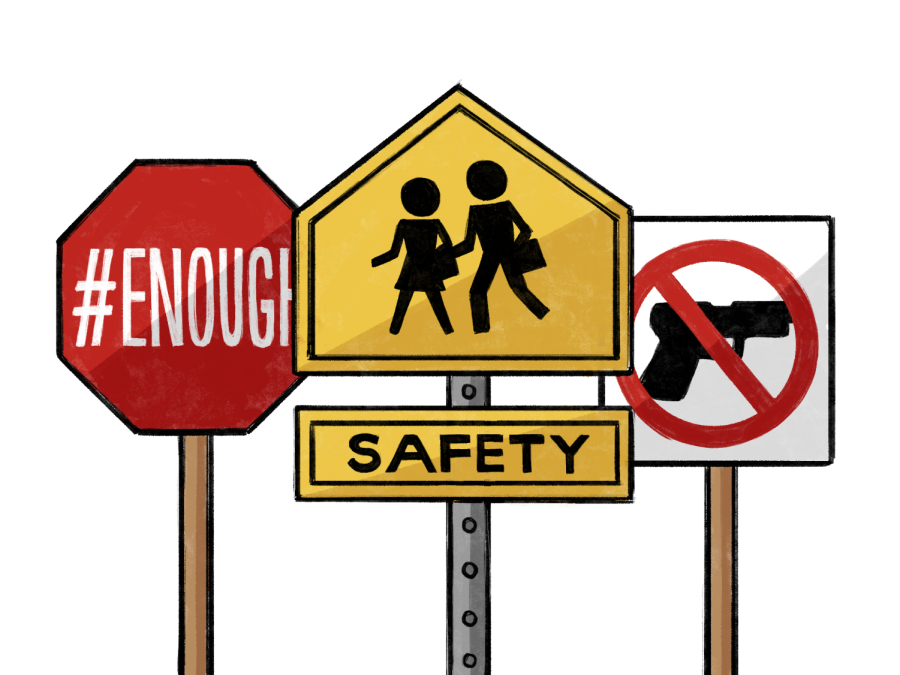FOCUS: SCHS students and staff reflect on the importance of campus secu- rity and mental health in preventing school shootings
In recent years, the debate over school safety and gun violence has grown from a small group into a nationwide discussion. For every school shooting that occurs, another spark is added to the flame of discussion amongst families, education staff and politicians. Some have become desensitized to public shootings to the point that The Onion, a popular satirical news site, publishes articles with the titles like “‘No Way to Prevent This,’ says the Only Nation Where This Regularly Happens” when school shootings occur.
Given the nature of the debate, many have put forth potential solutions to prevent a repeating event, ranging from nationwide gun control to the installation of security equipment. The majority of these ideas center around the presence of law enforcement, the use of mental health professionals and technology for early intervention and emergency drills to prepare students.
While Santa Clara seemingly is a safe community, many feel campus security is doing its best to keep students safe. Some, like English teacher Hannah Blue, believe that employing officers on campus can be beneficial.
“When done well, having an SRO – school resource officer – can be a really cool resource and an opportunity to develop relationships with the campus,” Blue said.
Others think that effective student resource officers take more open-minded approaches to students and staff, serving as both deterrents and pillars of support in the community. The employment of one, however, is controversial. Senior Noel Cevallos believes that campus security is more suited to treat students at SCHS.
“I don’t feel that law enforcement on campus is necessary,” Cevallos said. “The amount of people that are suspicious of holding, you know, weapons of violence or just weapons is low, and I feel law enforcement on campus would just create more hysteria.”
There is a belief that their presence negatively affects student morale, leaving some to ponder which benefits outweigh the downsides.
“I don’t want the school to feel like a prison and for students to feel scared,” Blue said. “Also, how do we maintain or make sure that if we think that there’s increased threats, that there are people there who are prepared to handle it?”
While there are disagreements about employing officers of the law, many concur that mental health professionals can provide the best outcome for students. These professionals can offer early intervention, provide outreach and improve morale amongst students, especially when they are at their lowest.
Many, like Junior Ethan Louie, support the allocation of resources and additional funding from the district to hire professionals and support mental health.
“I would support more funding as long as it doesn’t come at the cost of some of their important things. If they’re (the district) cutting teacher salaries to fund this, I’m not too sure how I feel about that, but I would support them having more funding as long as it’s not coming from anything too important,” Louie said.
Ultimately, the brunt of the responsibility falls upon the school administration, to prepare for such an event and to educate students and staff on what to do. Both students and staff are aware of more common emergency drills, such as the fire and earthquake drills, but rarely are shelter-in-place or run-hide-defend drills conducted on campus. Run-hide-defend drills often consist of students watching or listening to a presentation on how to act, and then practice the drills in phases, usually with an announcement made ahead of time.
“I think this school has done a good job with preparing us for earthquakes and fires,” Cevallos said. “I feel like we’ve done less – relatively less – things to combat school shootings.”
Cevallos is not the only person concerned about staff readiness, student preparedness and SCHS’s overall security. Regardless, the community is in favor of having drills for both students and teachers to better prepare them for the worst-case scenario.
“I think if you have one every year giving students a refresher, that would be helpful, especially since they have kids coming in every year, and there’s not always school shooting drills like fire drills and earthquake drills at other schools,” Cevallos said.


